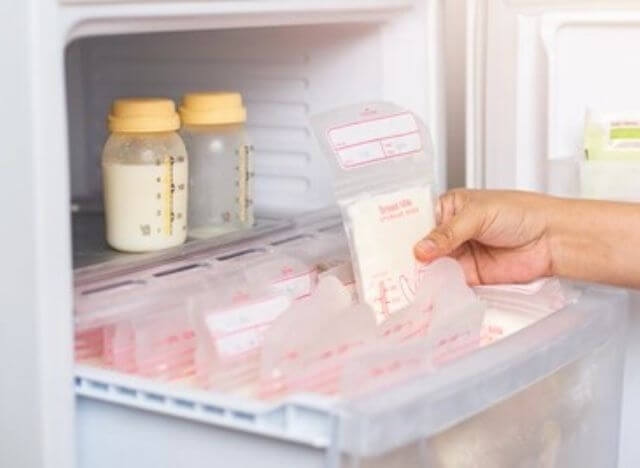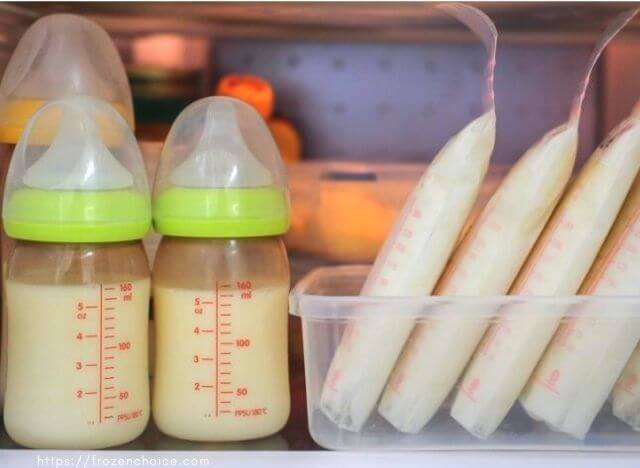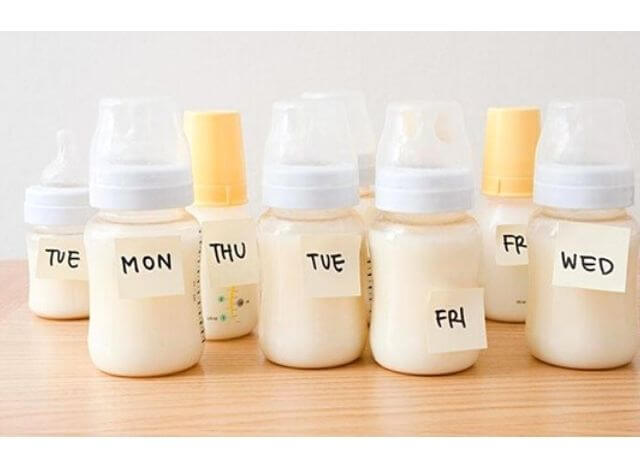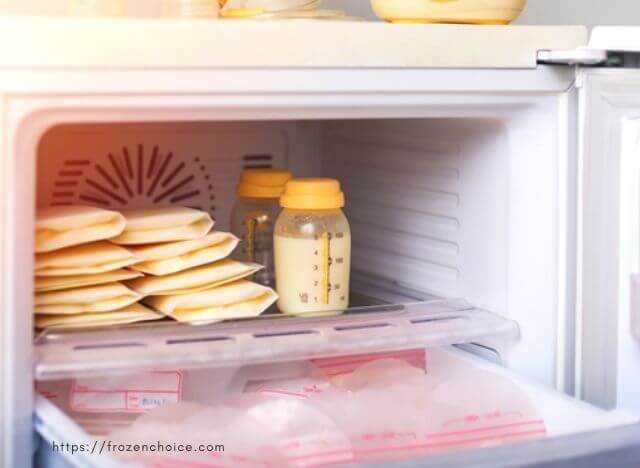Today, modern mothers are no longer strange to the habit of storing breast milk in the refrigerator. Expressing and keeping milk helps mothers be more active in taking care of their babies. This article will guide you on how to refrigerate breast milk.
Protect breast milk with a milk storage bag
In a day, if the amount of breast milk is large and the baby does not drink all of it, you can store it in a milk storage bag. Follow these steps to store breast milk for your baby in the refrigerator:
If stored in the freezer
Use a pen to write the date on the milk storage bag and set the freezer compartment of the refrigerator to store at -18 degrees Celsius. Do not store in the freezer door because the temperature is not cold enough; it will not be as stable as inside.
If stored in the refrigerator
You can store breast milk in the refrigerator for 24 hours. Because milk stored in the fridge has a shelf life of 48 hours. If you don’t use all of the milk, write down the date and year and transfer it to the freezer.
To properly store breast milk in the refrigerator, you should buy specialized milk storage bags specifically designed to keep breast milk. Put the milk in a bag to squeeze out all the air. Note, do not fill the bag too full with milk because milk is a liquid, so when it freezes, it will expand. It would be best to choose a 2-zip pack to store better quality milk.
Further reading: How to Choose the Best Mini Fridge for Breast Milk

Store breast milk with a milk storage bottle
- Use plastic or glass bottles with lids to store milk. However, glass jars are usually better than plastic ones.
- Clean the bottle with bottle cleaning solution and warm water, let it dry before use. You should not overfill the milk but leave a gap.
Note: Plastic bottles can be deformed when the milk is frozen, so it is easy to break. Glass bottles can also fail if not used properly, so you should read the product instructions carefully before using. In addition, you must not store breast milk in a bottle that is chipped or cracked.
Notes when storing breast milk in the refrigerator
Before and after storing breast milk in the refrigerator, you need to pay attention to the following notes.
- Wash your hands thoroughly and carefully clean, sterilize the pump equipment, milk storage containers, baby bottles, and other feeding items to protect your breast milk from contamination.
- Use good quality glass or plastic bottles that are specialized for storing breast milk. Do not use the ice trays.
- Store the breast milk in fridge or freezer right after it is expressed. Even though the expressed milk can stay at room temperature for 4 hours, it is best to refrigerate as soon as possible.
- Do not add fresh breast milk to frozen milk.
- Do not defrost breast milk in a microwave or hot water. The rapid and sudden changes in temperature will significantly reduce or destroy beneficial nutrients and antibodies in breast milk.
- Breast milk that has been thawed and given to the baby, if not used up, should be thrown away. Do not keep or refreeze for later use.
Further reading: Best Top-Freezer Refrigerator without Ice Maker
How to defrost and reheat milk properly, ensuring nutrition
Once you know how to store breast milk in the refrigerator properly, watch how to defrost and reheat your baby’s milk to ensure it’s full of nutrients.
Based on the milking time, you will take the oldest milk first, then warm it and give it to the baby first. The milk, stored after, will be used later. Apply the rule “first in, first out” because the quality of breast milk can decrease after a long time in fridge.
Do not thaw milk at room temperature as this will increase bacteria in the milk. To defrost breast milk, you can steam or warm the milk by placing the milk container in a bowl of hot water about 40 degrees Celsius.
Microwaves can destroy infection-fighting antibodies in breast milk. Therefore, you should not use the microwave to warm milk.
Gently shake the bottle to mix the whey and milk. Do not shake too vigorously, as this will destroy some of the valuable nutrients in the milk. Before giving it to your baby, soak the bottle in warm water to increase the temperature of the milk to body temperature. If the baby does not finish the milk after defrosting, it must be discarded and not reused.
Some mothers have high lipase levels (an enzyme that digests fat) in milk. It will give the milk a soapy taste that many babies do not want to drink when thawing. In this case, you can gently heat the milk at 80-82 degrees Celsius to remove the lipase. Then cool quickly and store the milk again in the refrigerator.

How long can breast milk be stored in the fridge?
In refrigerator: Breast milk stored in the refrigerator at 0 degrees Celsius can be kept for 4 to 8 days.
Milk stored in the freezer: Breast milk stored in the freezer at about -20 degrees Celsius will keep for two weeks. If the freezer has a separate door and has a temperature of about -35 degrees Celsius, breast milk can be stored for 3-6 months (this depends on how often the door is opened and closed). If you have a locked freezer, rarely opened, and the temperature is about -40 degrees Celsius, the milk can be kept for 12 months.
You should use milk as soon as possible. Some studies recommend that the longer you store your milk, the more vitamin C in the milk will be lost even if you store it properly in the refrigerator. Other studies have shown that keeping milk in the fridge for more than two days can reduce breast milk’s ability to kill bacteria, and long-term freezing can reduce fat content in milk.
Further reading: What Are the Best Cheap Freezers for Home?
Does the taste of milk change when stored in the refrigerator?
Milk stored in the refrigerator often has a soapy smell. After defrosting, milk has a more intense aroma than milk before refrigerating. The enzyme lipase in breast milk breaks down fats into fatty acids. When the baby suckles directly, this process usually happens after the milk enters the baby’s digestive system, the purpose is to support the baby to digest breast milk well. So it is no harm to babies, but some babies will refuse to drink this milk.

Storage tips
- Clearly label with the dates, so you know when it’s expired.
- Do not store the breast milk in the door of fridge or freezer. The temperature changes from the door opening and closing may spoil the milk. It should be put at the back of the refrigerator or freezer, where the temperature is the coolest and stable.
- If you plan to use the breast milk within 4 days, refrigerate it. If it’s more than 4 days, freeze it as soon as possible.
- When traveling, you can store breast milk in an insulated cooler with ice packs for up to 24 hours. Once you arrive the place, use the milk right away, store it in the fridge, or freeze it.
- You should store small amount of milk in each container (about 2 to 4 ounces), so the milk will not be wasted. Leave one inch of space at the top of the container for the milk to expand when freezing.
Conclusion
Hopefully, through the article on how to store breast milk in the refrigerator, you can preserve the milk for a long time and ensure the nutritional quality for your baby.
Reference:
Proper Storage and Preparation of Breast Milk, cdc.gov, Retrieved on Feb. 7, 2022

